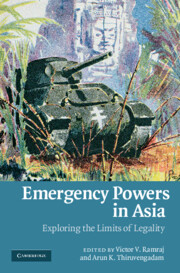Book contents
- Frontmatter
- Contents
- List of contributors
- Preface
- 1 Introduction: emergency powers and constitutionalism in Asia
- PART I Perspectives from legal and political theory
- PART II Postcolonial and post-conflict transitions
- PART III Emergencies, executive power and constitutional order
- PART IV The role of the courts
- Index
Preface
Published online by Cambridge University Press: 04 August 2010
- Frontmatter
- Contents
- List of contributors
- Preface
- 1 Introduction: emergency powers and constitutionalism in Asia
- PART I Perspectives from legal and political theory
- PART II Postcolonial and post-conflict transitions
- PART III Emergencies, executive power and constitutional order
- PART IV The role of the courts
- Index
Summary
This book is the final instalment in an accidental trilogy. The ‘trilogy’ began with the publication by Cambridge University Press of a symposium volume, Global Anti-Terrorism Law and Policy (edited by Victor V. Ramraj, Michael Hor and Kent Roach), in 2005. The debate between David Dyzenhaus and Oren Gross over emergency powers in that book was the inspiration for another symposium (in which Arun was involved as a session chair) and another collection, Emergencies and the Limits of Legality (edited by Victor V. Ramraj), published in 2008. That collection in turn prompted the central question posed at the May 2008 symposium at the National University of Singapore Law School that shaped this volume: what relevance do the debates on emergency powers in liberal constitutional democracies have for the actual experience of and scholarly reflections on emergency powers in Asia?
Questions of this sort are important not only because of the reflections they stimulate. They are also important because they challenge an all-too-human tendency to look to the familiar first. We have both been struck in our research by the extent to which comparative constitutional studies in English are often limited to North American and European jurisdictions, Australia and increasingly, these days, South Africa. Rare is the study that engages Asian jurisdictions. Within Asia as well, we find a tendency to look within or to gaze outward to the West, rather than to reflect on the experiences in neighbouring countries.
Information
- Type
- Chapter
- Information
- Emergency Powers in AsiaExploring the Limits of Legality, pp. xi - xiiPublisher: Cambridge University PressPrint publication year: 2009
